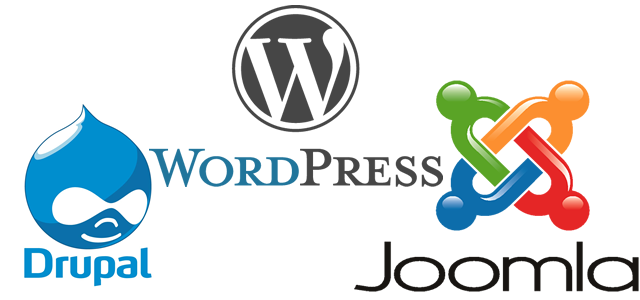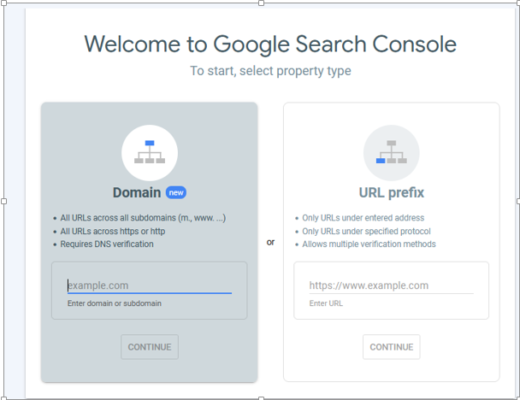WordPress, Joomla, and Drupal are commonly known as Content Management Systems. They deliver website administration, authoring, and collaboration tools for easy designing and managing website content.
WordPress
WordPress is the most popularly used CMS among the three, because of its ease to use. At first, it was accustomed to being a blogging platform, but over time it has evolved in a way that it is being used to make websites other than just blogs. WordPress has attracted many businesses due to its easy, simple, and fast learning curve and development.

Advantages of WordPress
WordPress’ installation is easy and not complex; this kind of ease makes many people opt for it. Most companies that offer web hosting services tend to offer a “one-click” install for WordPress like in the Cpanel.
WordPress tends to have many themes that can either be gotten online or on the dashboard after installation.
Plugins: Like the modules in Joomla, WordPress has plugins that add functionality to the website. Plugins are chosen according to owner’s preference in the dashboard or online.
It has great SEO capabilities, making it suitable for blogs. They are certain SEO plugins that can be installed for better indexing of the website and generating traffic.
WordPress is free to use and has no pricing. It also has many free plugins and themes to choose from and others are not that expensive.
It has a powerful forum because of its many users with many questions and answers. Has very strong community support because of helpful contributors.
Disadvantages of WordPress
WordPress can become difficult to handle when there is large traffic. If it is an online portal where numerous things are done, it may need more resources to make sure the website still remains functional as required.
Some plugins tend to be badly coded and thus may interfere with installation and general security. This may not be detected at first because of the lack of a good control check during the installation of the plugins.
Joomla
Joomla is the second easiest to use after WordPress. It has similarities with WordPress such as modules-plugins, themes, and components.

Advantages of Joomla
Joomla is easy to use and install. It is not as complex as Drupal but not as easy as WordPress.
In Joomla, one can easily create a social networking website.
It is suitable for e-commerce websites for online stores.
It is not too technical and requires moderate technical skills.
It offers a great help portal/forum for all queries.
Joomla is also free to download and install, but its hosting services are not free.
Disadvantages of Joomla
It doesn’t have a strong security system.
Lacks some Search Engine Optimization capabilities and requires some adjustments.
image courtesy: sitepoint
Drupal
It is the most difficult to use and also the most advanced CMS among the three. It can be used for intranets, web projects, multilingual web applications, and business websites.

Advantages of Drupal
It is a powerful open source that requires fewer server resources, making its pages load very fast.
Drupal is flexible enough to handle any type of website. Can function as a web application, intranet, and websites (both small and large websites)
It is SEO friendly, very effective, and reliable even when your website has a lot of traffic and visitors.
It is easy to customize due to available plugins, themes, extensions, and the capability to edit root files.
Generally, it is technically advanced
It is free to download and install on the hosting server.
Disadvantages of Drupal
It is very complicated to handle and thus more popular with developers than beginners.
It is not user-friendly.
It requires technical experience with some basics in HTML, PHP, and other web programming languages.
Overall Comparison
Popularity: WordPress is the most popularly used CMS for blogs and fewer complex websites while Drupal is the most popularly used CMS for businesses (large and small businesses). On the other hand, Joomla can be used for both functions.
Complexity: Drupal is the most complex among the three followed by Joomla then WordPress.
High Job Trends: Drupal tops in this category, as its job rate increases three times more than WordPress and Joomla due to its technicality. WordPress tops in the freelance market.
Security: Drupal is the most secure followed by Joomla, because of common security vulnerabilities making it secure for big businesses. WordPress is also secure, but tends to be corrupted by bad codes in plugins used, poor hosting configurations, security holes, and careless users.
Search Engine Optimization: Drupal and WordPress have many features to use for SEO. The majority of webmasters tend to use WordPress and Drupal because Yahoo, Google, and Bing love these two CMS. Joomla can also be optimized by the use of certain modules and extensions.
Usability: WordPress is used for small to medium-sized websites, smaller e-commerce stores, news sites, and blogging sites. Add-ons can also be used to expand functionality. Joomla is used for standard websites: blogs, forums, e-commerce stores, social networking, and static front end. Drupal is a powerful developer-friendly tool best suited for complex websites that require data organization, multiple users, and online stores.
Installation: WordPress does not require much technical experience, Joomla requires moderate technical experience and Drupal requires the most technical experience.
Features: WordPress is popular for its extensive selection of themes, user-friendliness, and ease of use. Joomla is designed for community platforms as it has strong social networking features. Drupal is known for its powerful ability to categorize, tag, and organize complex content.
Speed: WordPress can handle traffic well if it has great hosting plans. Joomla depends on its configuration and can easily consume resources, making it load slowly. Drupal loads quickly and has a faster response than WordPress and Joomla.



